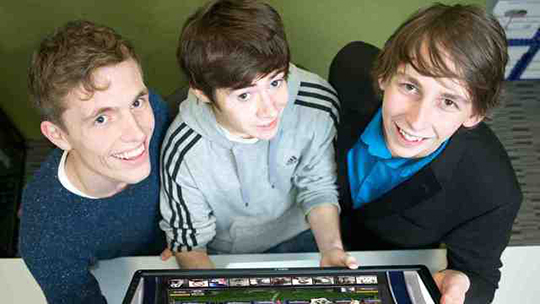Design grads head to Melbourne
When three Victoria University of Wellington students took part in the Viclink Futures Bootcamp during the summer of 2012/13, they wanted to learn how to build a business around their passion for developing computer games. They duly formed their own company, One Legged Crab (OLC) and, just 18 months later, were flying to Melbourne to showcase one of their games – Boy Goes To Space (BGTS) – at PAX Australia.

When three Victoria University of Wellington students took part in the Viclink Futures Bootcamp during the summer of 2012/13, they wanted to learn how to build a business around their passion for developing computer games. They duly formed their own company, One Legged Crab (OLC) and, just 18 months later, were flying to Melbourne to showcase one of their games – Boy Goes To Space (BGTS) – at PAX Australia.
The game attracted a huge amount of interest amongst the gaming convention’s 75,000 attendees, including Japan’s biggest publisher of desktop games which subsequently signed a contract with OLC to translate and release BGTS into Japan.
Team OLC, which consists of Ryan Loader, Alistair St Pierre and Chris Mather (pictured, L to R), put a massive amount of work into the lead up to PAX Australia, making handmade marshmallow beanbags and painstakingly cutting out pixelated tree pieces. They also printed 1,000 business cards and stickers – which they gave away within the first three hours of the three-day show! “It was a little crazy,” says Chris. “We had a constant queue of people wanting to play our game.”
He says they had several objectives for attending the convention. The first was to build contacts – “we made so many, including Microsoft and Wii Australia, that it took us three weeks to follow them up once we got home” – and the second, to get direct feedback from gamers about BGTS.
“We originally thought that our target market would be the ‘triple A’ gamers, the predominantly under-25 males who play console games like X-Box and Playstation,” explains Chris. “But what we learnt from observing players was that BGTS is more attractive to the younger kids, adults over 25, and way more females than we thought. The console gamers weren’t used to games like ours, which have puzzles built into them, and often found it difficult to solve them.”
Many of the PAX attendees – who were games developers or designers themselves – were surprised by OLC’s ‘two week’ approach to game design. “In the beginning, it took us over a year to develop a game which then didn’t really take off,” Chris explains. “We decided to refocus our efforts and develop a new game every two weeks for three months at a time, then take on contract work for the following three months to pay the bills – just until we start selling enough games to become self-sustaining. BGTS is one of 14 games to come out of that approach so far!”
A real point of difference for OLC is that the team has deliberately set out to make games with real world tangible value, intentionally leaving behind the guns and war masquerades. “We’re more interested in creating communities around games, helping people work together to achieve goals,” says Chris. He cites the example of Foldit, a game released by University of Washington scientists in the hope that a critical mass of gamers would play around with folding proteins and, in the process, uncover some of their intrigue. In a matter of 10 days, gamers were able to do what biochemists had been trying to do for a decade: decipher the structure of a protein that is key to the way HIV multiplies – something that will likely help scientists develop drugs to halt that growth. “That’s pretty powerful stuff for a game to achieve.”
Chris says support from Viclink, including initial funding to help get the company underway, has been crucial to the establishment and continuation of OLC. “Viclink has been there for us all the way – from sponsoring our participation in the bootcamp right through to helping us take one of our products, Proleague, to potential partners, clients and investors.” He also credits Wellington’s BizDojo – a network of co-working environments for entrepreneurial techies and creatives – for providing them with invaluable mentoring and networking opportunities – and of course office space to work in.
So where to from here for the talented team? OLS plans to double its staff numbers in the next 12 months and ultimately contribute to a shift in perception about gaming – “we’d love to change the focus from ‘gaming for entertainment’ to ‘interactive media for social good’”, Chris concludes.
